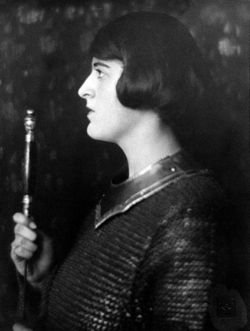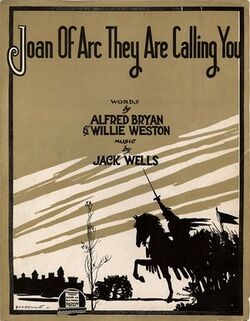Joan of Arc, memory of: Difference between revisions
imported>Russell Potter (→Joan of Arc in poetry and music: continuing this section) |
imported>Russell Potter |
||
| Line 19: | Line 19: | ||
==Joan of Arc in poetry and music== | ==Joan of Arc in poetry and music== | ||
[[ | [[Image:Joan calling.jpeg|thumb|right|250px|A sheet music cover from 1917]] | ||
Joan, like many figures of broad appeal to a variety of causes, was soon the subject of popular ballads and poetry. One of the earliest is a poem dedicated to her 1429 by [[Christine de Pizan]], "Hymn to Joan of Arc"; it is the only known tribute composed while Joan was still living. Other treatments include Voltaire's mock-epic ''The Maid of Oranges'', along with Friedrich Schiller's dramatic rebuttal to Volatire, ''The Maid of Orléans''. | Joan, like many figures of broad appeal to a variety of causes, was soon the subject of popular ballads and poetry. One of the earliest is a poem dedicated to her 1429 by [[Christine de Pizan]], "Hymn to Joan of Arc"; it is the only known tribute composed while Joan was still living. Other treatments include Voltaire's mock-epic ''The Maid of Oranges'', along with Friedrich Schiller's dramatic rebuttal to Volatire, ''The Maid of Orléans''. | ||
Revision as of 08:25, 6 July 2007

Among the many important figures of history, some few stand out as transcending the accidents of their time and place. The young 15th century French peasant girl, known to history as Joan of Arc, who led her nation's armies to victory in the later stages of the Hundred Years' War and became a French national heroine, is one such.
In Joan's case, although she has become a French national heroine, she has also become a heroine to many of other nationalities. And although she was a pious and devout Catholic (and, since 1920, a recognized saint within the Catholic Church), she has become a religious inspiration to many of other faiths and, not only people of faith, but aetheists and agnostics as well. And although very much a child of the 15th century, into which she was born, she has remained an inspiration over the centuries since.
Belonging to all people, all times, and all religions, the transcendent figures of history possess two biographies. First, there is the record of their lives and deeds. In Joan's case, the documentary sources for this are voluminous, especially when one considers the fact that she lived in the years before the printing press and widespread literacy, and was also young, female, and not of noble class.
But beyond Joan's actual life, there is a second biography, and that is the record of how men and women of subsequent ages have viewed her as seen in literature, drama, folklore, and other other media and forms. The story of Joan of Arc, as seen by her viewers and storytellers, is the subject of this article.
Joan's voices and visions
The subject of the nature and origin of the voices and visions which Joan of Arc experienced has been of intense interest not only to her contemporaries, but to scholars, religious figures, and students of history all the way down to modern times.
Joan of Arc on film
The Passion of Joan of Arc (1928)
The Passion of Joan of Arc (original French title La Passion de Jeanne d'Arc) is perhaps the most powerful treatment of Joan's story ever flmed. Produced in France in 1928 by Carl Theodor Dreyer, it featured Renée Jeanne Falconetti in the title role.
Joan of Arc in poetry and music
Joan, like many figures of broad appeal to a variety of causes, was soon the subject of popular ballads and poetry. One of the earliest is a poem dedicated to her 1429 by Christine de Pizan, "Hymn to Joan of Arc"; it is the only known tribute composed while Joan was still living. Other treatments include Voltaire's mock-epic The Maid of Oranges, along with Friedrich Schiller's dramatic rebuttal to Volatire, The Maid of Orléans.
In classical music, Joan has been celebrated as the subject of a number of operas and musical dramatizations.
In popular and art music, Joan has also been a recurrent subject. Best-known is Leonard Cohen's ballad "Joan of Arc," which takes as its conceit a dialogue between Joan and the fire which is about to consume her; in its most memorable recording, Jennifer Warnes sings the part of Joan, while Cohen sings that of the fire. Art song treatments of Joan go at least as far back as 1953, when Ballade des Dames du temps jadis, Georges Brassens's adaptation of a poem by François Villon, was composed. In 1982, the band Orchestral Maneouvres in the Dark released two singles, "Joan of Arc" and "Maid of Orleans." In 2005, Kate Bush recorded "Joanni" on her album Aerial.
A different tradition from these art songs can be found in military and patriotic songs which invoke Joan as a leader and inspiration to action; a number of these were popular in World War I and World War II. With titles such as "Joan of Arc They Are Calling You," these songs attempted to evoke a patriotic sense of duty by recalling Joan's bravery in battle.
Further reading
- Fresh Verdicts on Joan of Arc, edited by Bonnie Wheeler
- Marina Warner, Joan of Arc: the Image of Female Heroism, University of California Press, 1981
- Timothy Wilson-Smith, Joan of Arc: Maid, Myth, and History, Sutton Publishing, 2006, ISBN 0-7509-4341-6
Internet resources
- Joan of Arc in the First World War by B.J. Omanson, covers interest in Joan of Arc during the First World War.
